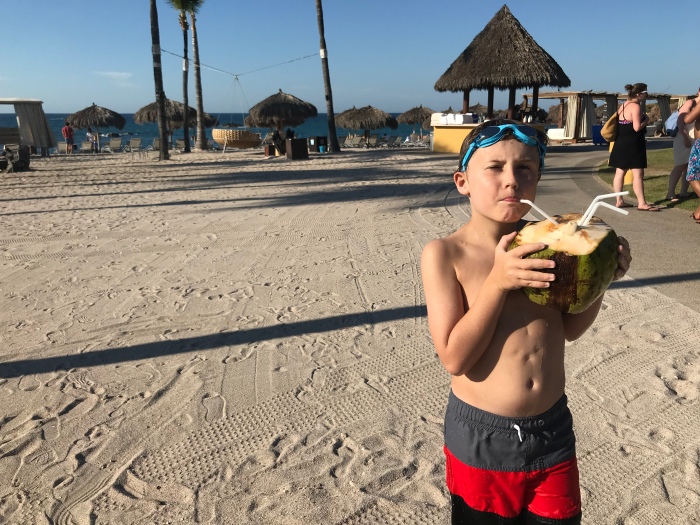So, I am really bad about updating this blog but want to keep it going for those of you out there who are just starting this “heart” journey with your baby or those who are looking for others who share their story.
Luke is 10 and in 5th grade. He sees his cardiologist on an annual basis and has had a very steady path of health. He has mild “neo-aortic insufficency” which means he has a mild leak in the aortic valve and the neo just means they placed the aortic root in a new spot when they did his open heart surgery. We’ve been following this leak for years and it hasn’t changed yet.
Luke was on a medicine called Enalapril every 12 hours for years to hopefully lower the pressures in his heart and preserve valve function. Our cardiologist decided to take him off the medicine this year. When Luke was on Enalapril he got tired easier, was bothered by heat and dehydration very easily and suffered from migraines. Those issues seemed to resolve as soon as he stopped taking the medicine.

Luke’s cardiologist talked to me about the possibility of learning disabilities that can be related to having been on cardio pulmonary bypass (heart lung bypass machine) during open hear surgery. Luke’s condition d-TGA carries a high risk of ADHD. Luke had greater complications than most with d-TGA, suffering a coronary event (heart attack) after his first open heart surgery and he had to be rushed back into surgery and put back on the bypass machine for some time. Luke did have delays with his gross motor development and we worked with ECI (early childhood intervention) to get him physical therapy until he caught up.
I feel visual-spatial visual-motor skills have always been a challenge for Luke (kicking a ball, hitting a t-ball, crossing midline). His skills with executive functioning are also an area where he has struggled (multiple step directions, remembering steps, etc). Inattention has been a big issue since starting kindergarten.
I took Luke for a neuro-psychological evaluation at the end of 2nd grade. We found that Luke has pretty severe ADHD-PI (primarily inattentive). He was also diagnosed with dysgraphia, which is a neurological disorder that makes it hard, physically, to write. It’s in the same family as dyslexia. We’re trying to get him as much support as possible at school…. and we’re hitting it hard at home too.
We also learned Luke is above average intelligence and above average in a lot of other areas. He’s bright, creative, empathetic and has a really great sense of humor. He will do great in life and is capable of anything he puts his mind to. Having learning problems is not an indicator of intelligence and does not mean your kid is lazy. If these issues affect your kid, they likely have to work harder than other kids to do what comes easily for others… and that’s frustrating and can hit confidence.

We went with an IEP for Luke this year so he’s in the “collaborative” classroom where there is an extra teacher in the classroom during math, language arts, science and social studies to move around and help all the kids who need extra help. This is a resource available through a federal program called IDEA. The other kids in the class don’t know who the collaborative teacher is there for because they help all the kids… but really focus in on the kids with the IEPs.
He has received Occupational Therapy and Vision Therapy which have made a world of difference for his in his ability and confidence. We’re getting help but realize he’ll still need extra time, accommodations, tutoring and support as he moves through school — like a lot of kids do who haven’t had open heart surgery.
If you suspect there is a problem don’t delay getting your child evaluated. There are tons of resources available privately and at school (federal IDEA program) to help children overcome these issues. New research shows that many children with congenital heart disease (CHD) are at risk of developmental delays that can affect learning, behavior and social skills. But, there is good news; most children with CHD do not have severe developmental issues, and can be helped with the appropriate help at school.
How can you help your child?
- Understand how the CHD may affect your child. Read the American Heart Association article published last year on neurodevelopmental outcomes to see the connection between these and CHD, and consider having your child tested using the guidelines provided.
- Make sure you understand how best to communicate your child’s needs with the school. You need to be familiar with Early Intervention, 504 plans, and Individualized Education Plans (IEPs) to ensure that your child gets the best help possible.
Below are some resources I’ve found:
Developmental_issues_and_CHD_2013
Overview_of_Services_EI_IEP_504_2013
Anyhow, I wanted to share what I’ve learned and encourage you to continue advocating for your kid and getting help and resources where needed.
That’s all for now. God bless!

Thanks for all the work you put into sharing your story. We just found out one of our twin boys (expected July 2018) has TGA and will need arterial switch surgery within hours of his birth. I’m trying to wrap my head around what this could mean for his life and it’s so helpful to read stories of families who have gone through this before us. Your son looks so happy and healthy! God bless – Hannah
Hi Hannah, Sorry to learn this news but I’m glad you have time to prepare and educate yourself. If you haven’t found it already there is a great support group on Facebook: https://www.facebook.com/groups/17274383983/